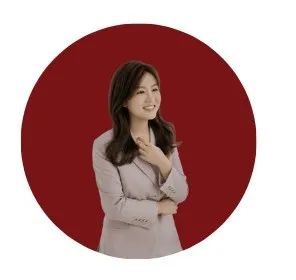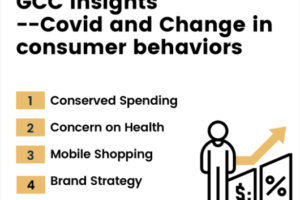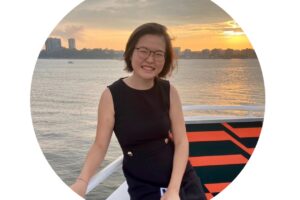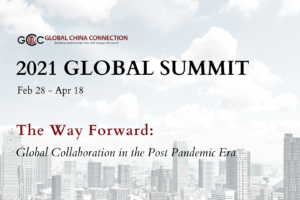Introduction
Please give a short self-introduction
Hi everyone, I’m Lifan, and I’ve been with GCC Global Team for two terms as VP of marketing and Senior VP, I think. I studied finance and information systems at Kelley School of Business in Indiana, and I spent less than three years finishing my undergraduate program, and then I finished my undergraduate degree in the form of 3+1. I decided to switch to the education industry and got my second master’s degree at Harvard, which was a big career change. Therefore, I chose to return to China to start my own business after 10 years in the US, and now I also start to provide some one-on-one coaching consulting services for career planning and career transition.
GCC
Could you please share your experience at GCC? To what extent, did this influence your choice to pursue a career in education?
I worked at EY for three years, during which time I joined GCC central management, and we ran the first summit in Cornell and the second in New York. These two summits were held during my three years of employment. Because I was working in New York, I wanted to help students as a mentor at GCC, such as doing mock interviews, looking for jobs, and helping them connect to the banking and consulting fields. In this process, I have been able to meet many students and participate in their personal growth. I became more and more interested in personal growth, leadership development, and other education-related things.
During this time I went to the World Bank Youth Summit where I met a Harvard professor and I shared many of my ideas with him. He asked me why, with my background, I didn’t try to enter an education-related industry so that I could better reach my goals. He thought I was a very enthusiastic person and told me not to think of education in a very narrow way. Because I am already doing something in education, I just need to study and research theoretical knowledge of education systematically again and get in touch with people who do front-line education-related things, so I can better shine in the education industry, right? I agree with this point because I am not going to be a teacher and teach a class, I want to do a wide range of education. I want to reach out to people who are deeply involved in education and combine that with the Business Mindset that I have honed over the years, and then sublimate them. So I may not be a typical education practitioner who comes from an education background.
In the consulting industry, applying for MBA and then coming back for promotion is actually a relatively standard path, but because of the encounter at WB and the subsequent communication with the mentors in my life, I finally applied for the education master’s at Harvard because I wanted to explore the field of education, personal growth, organizational development, and leadership. Later, I successfully entered Harvard to read Master of Technology Innovation Education, which is an educational program based on a certain professional background in computer science or technology.
What was your career path after graduating from Harvard? What role did GCC play in this period?
After graduation, I joined a Jewish family education group founded by Harvard and Yale law graduates who came from elite Jewish families. I appreciated the mostly Jewish perspective on homeschooling and planning, so I got along well with them. They valued my business background, because many people who choose to do education may have never done business, so it is rare to have a management-related mindset, but how many people who do business are willing to do education? At that time, the company mainly had offices in the east, in the west coast is still relatively lacking roots. As the office director of the West Coast, I went to explore the West Coast market and was responsible for the business development, office operation, and sales business of the West Coast. I moved from Boston to California because the business covered Seattle to North and South Canada.
My philosophy of education is that “parents are good teachers for their children, but they are not the best teachers for their children”. As parents, the parent-child relationship is the most important, but we also need a more objective perspective on our children, and that requires a family counselor. I agree with this one. I have been working on the West Coast for more than two years, and I have held many seminars because to do marketing, I have to do a lot of online and offline promotion, cooperate with various types of companies on the West Coast, and do BD and so on. These are all very interesting to me. The events and summits held at GCC are our central management to select the chapter to handle the matters about the summit. As central management, we are more of an alumni link, invite guests, and so on, which is very similar to my work as a BD. We need to cooperate with the whole team in the whole process of organizing the summit. I think GCC has given me a rich experience in planning, event planning, and organizing. When I was in charge of the company, I went from no office, no marketing, to setting up an office, to more people understanding the existence of this company, this kind of a 0 to 1 process, in terms of ability, I think there is a lot of common ground with what I did in GCC.
About Work
Do you have any insights and feelings about your work experience as a consultant?
I have been flying around almost every week for the past three years in consulting, spending most of my time on planes. Looking upward in the workplace, as a girl, and in a local white dominates industry, it is really hard for me to find my role model. in fact, as an Asian woman in the financial consulting field is still more advantageous compared to Asian men, the overall upward prospect is very clear. consulting is a good work field and opportunity, If you like this field and don’t mind being a “trapeze artist”, I think it is a gas pedal that can speed up the growth from student to society and enhance the career ability quickly. I am very grateful for the years of training, many times I was up at six o’clock in the morning to meet with the team in India, and at the same time with the time difference between the U.S. East and the U.S. West, at night until twelve o’clock or even one in the morning will come out of the office.
I later gave up on continuing in the consulting field because I wanted to find a balance between work and life. As a woman, I am a person who is good at long-term planning and likes to break planning. If I keep going in consulting, I can see what kind of life I will experience in the future. In a sense it’s fine for me in the present, but what about the long term? I think what I call success is a combination of family and career. I do see some of my female leaders as having no life, or even no children. I had a partner on a project at the time who was never married until he was sixty. And there were even fewer executive women in the firm.
One of my Mentors, who was of Indian descent, was stuck in the position of senior manager, and it was hard to get promoted again, considering the ever-changing policy of permanent residency. She told me that she woke up in the morning with her baby in one hand, and had to make breakfast with the other hand, while her phone was on public play for a meeting, and she had to go home early in the afternoon to put her baby to bed before the nanny left, and then continue working until the early morning after the baby slept, and then get up again in the morning to repeat the routine. Her cousin came to visit her and after observing her life all day asked her, “Is this what you want? What are you rushing around like this for? She was speechless. She also knew that this was not what I wanted. So she was one of the few leaders in the company who was very supportive of my career change, and she said I had a light in my eyes when I talked about education and what I wanted to do.
Of course, there are people who will accept this life for their own definition of “success”, which I admire, but I have my own definition of success, which is to have a career I love and a healthy family relationship. Because I was thinking long-term, I knew that staying in financial consulting was not going to be my long-term path.
Did you expect to do another master’s degree after you graduated from your undergraduate program? How did you feel about doing a second master’s degree at Harvard?
I didn’t expect this, because I thought my school career was over. I took a lot of classes every semester and summer to graduate early, but I was also very enriched by the experiences and values that American universities can bring to me. Originally, the graduate program was a two-year program because half of the time we were allowed to do an internship and then come back to school. As an international student, it was difficult to get into finance or consulting at that time, so people would look for a six-month internship to be more secure in their jobs after graduation. Our program was a target program for the Big 4, and there were very few Chinese in that class, maybe 8 to 12 international students. At that time I also chose to take a risk, I wanted to see if I could find a job without an internship, it was very risky but I wanted to try. At that time, I just thought that if I studied again in the future, I would do a Ph.D. related to management or anthropology, or I would do an MBA for promotion, because I graduated from business school as an undergraduate, and after attending many MBA info sessions, I found that many of the courses were taken by my undergraduate, so if I just want to get a degree for promotion, it would not be worth my time to spend 2 years. It is worthwhile. I remember that I also concluded that there are three types of people who are more suitable to study MBA, and then I shared it widely with the clients who came to me for a one-on-one consultation, which is really useful. For those of us who came from business schools as undergraduates – and so it turns out – going to MBA is a lot of relearning courses and financial models, and many students are still tired of looking for new jobs and spend most of their time in networking.
Rather than making me anxious, Harvard has made me more at ease. What struck me most about Harvard, where I was in contact with more students studying liberal arts, was how the whole environment affected me, and how we all had non-utilitarian hearts. Everyone had great enthusiasm, everyone wanted to make a difference, and everyone was on the ground doing it.
The passion I felt from talking to them was like my passion for education, not my passion for my job. So I think the shift from a very financial, very business, very efficient, and numerical world to a dream-driven and impact-driven world gave me a sense of peace of mind and made me think more deeply about what I really want. And after working and then returning to campus, I was hungry to learn in every class and targeted to make up for my lack of knowledge in certain areas. At that time, I often read a lot of papers, and I have a deeper knowledge of some areas I am interested in, and I feel I have more material, instead of laughing at myself, saying my stomach is full of numbers and straw bags.
Suggestions
I think that behind all the decisions and experiences is more of your own exploration of self-worth, what do you think is the driving force behind your various decisions?
In the course of my client engagement, I have many clients who often come to me and say that they are very comfortable with me. Perhaps it’s my strength in communication that makes many companies and parent groups believe in my educational ideas. Most of these parents are company executives or bosses themselves, and in the process of chatting with me, they have a sense of clarity and are willing to pay for my time, to talk and communicate with me. In this process, a retired North American partner of Ernst & Young, my mentor, recommended me learn more about coaching. So I spent a year and a half getting the certification of a life coach in my spare time at work. A life coach, I call it a career coach, is actually more inclined than a relationship coach and growth coach. As an amateur status, it has enabled me to receive clients independently and help more people. Later, I decided to return to China because I wanted to help more people in a more systematic way with coaching dialogues, to find the direction on the way of growth, and to explore what I want. In the domestic environment, we all have no shortage of harvesting others’ advice and even a burden of “advice”, and forget to listen to our own voice and lose the ability of independent judgment. Now that I am back in China, I hope to explore the market, to do an accelerated cognition of entrepreneurs, investors, and the whole capital market, to find the field that needs me, and to do what I can.
There are people around me who think I have a rich life or a lot of changes. I often have friends who come to catch up with me after a short period of time, exclaiming at the things I have done and the rich experiences I have had, and realizing that I have come a long way. I would wonder if I was too unstable. But if you sort these things out, there is a clear logic behind them. Why I made the choices and attempts I did, and how I found them. If we look at the bigger picture, it’s that I’m learning more about myself step by step, knowing more clearly what I want more and what I want to do more. I remember when even my boss said he was very reluctant to write me a recommendation letter, not that he wouldn’t recommend me, but that I should go for an MBA and then come back to the company for a promotion and a raise. In this industry as an Asian girl, there will not be many people to so-called “roll” you, the path up is relatively clear, and get a high salary, and feel very shiny. As a “trapeze”, it is indeed the look of study will aspire to, but for me to wake up early every day to help a bank to avoid how much risk, these do not “wake me up”. So I have not stopped exploring.
Do you have any advice for college students and recently graduated graduates?
First of all, this is a special time, and instead of facing this uncertainty with a very negative attitude, it’s time to change a very positive perspective. It’s cool to experience such a big event in the world while you’re still a student, an event that is destined to be recorded in history! When you look back on your college in the future, it was uneventful and uncommon. The decisions you make along the way are sure to be a shining point, a redeeming memory when you look back. I hope you can think about the present moment with this positive attitude before making a decision. I believe that the decisions made with this attitude will turn out to be very benign. Secondly, when you feel that everything is stagnant, wouldn’t it be better if you could be the most daring person in this? For example, when I was in Lockdown in the US, most people wanted to wait slowly for the world to change for the better, yet I didn’t want to be the one who would just watch and wait, so I would make the biggest changes and accept the risks that come with it all under limited circumstances. Wouldn’t this way be able to experience more? But I recommend that you do whatever you want to try while being safe.
I know that everyone who is graduating soon is now torn between whether they should return to their home country or stay in the U.S. Personally, I think this varies from person to person. In the long run, we will all be global citizens and every decision we make will not be the end of the line and will not be forever. If you feel sorry for not working in the U.S. and going straight back to your home country, think about the fact that your experience studying in the U.S. has made you a person with a more global perspective. Don’t take it too seriously, the future is still long.
Finally, as feedback to GCC, if there are any GCCers who feel confused about their future career development and study path, welcome to follow my public number “糖炒的粒子”. I will provide a free 30-minute coaching session for the first 50 students.









